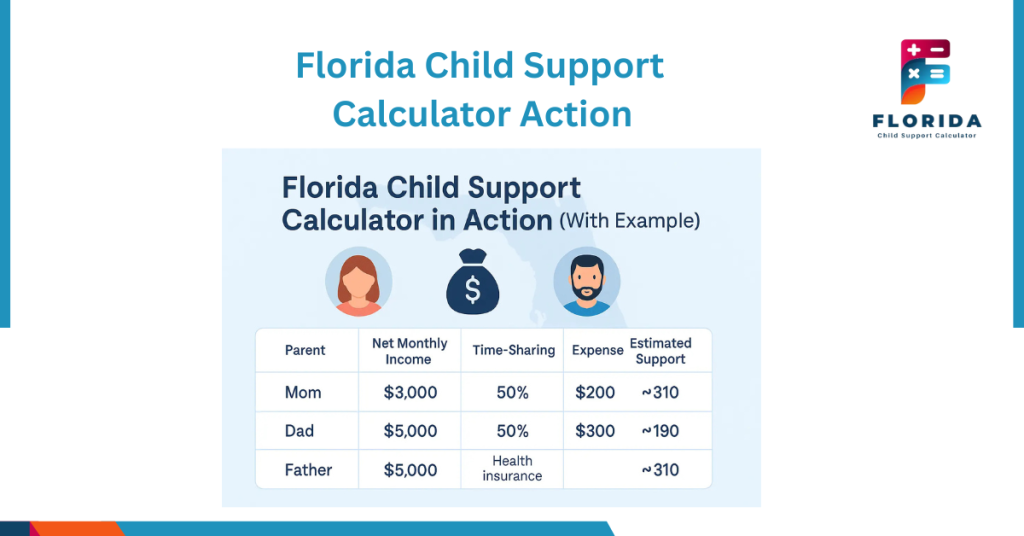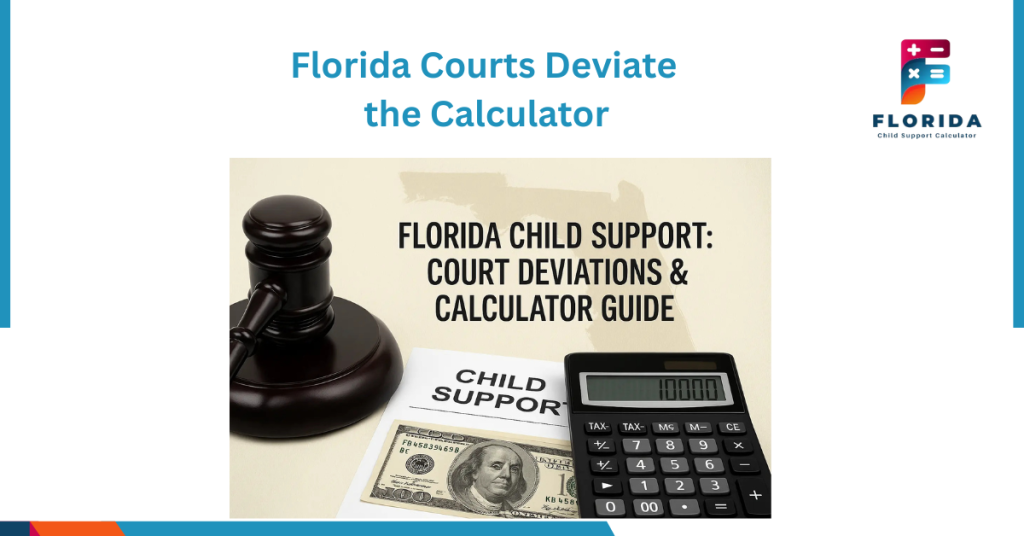Calculation Results
Combined Income:
Basic Monthly Obligation:
Additional Costs:
Total Support Obligation:
Husband's Contribution:
Wife's Contribution:
Note: There are chances of errors in this calculator because of sections. Please follow Section 61.30 of the Florida Statutes, but we tried our best to calculate accordingly.
The Florida Child Support Calculator isn’t magic, but it sure feels confusing at first. Think of it like a recipe; you add income, parenting time, and costs like daycare or insurance, and it gives you a number. Right from the start, it helps to know how your income is counted and why overnight visits matter. Even health and dental expenses can change how much you pay or receive. Whether you’re a parent, co-parent, or just curious, this guide will walk you through every step, with simple examples and real answers.
What Is the Florida Child Support Calculator?
When two parents don’t live together, the Florida Child Support Calculator helps figure out how much support one parent should pay. It’s not a guess, it follows a law-based formula made by the state.
This tool uses your monthly income and parenting time to give an estimate. It also looks at things like daycare, insurance, and how many kids you have. The calculator is built around the official child support guidelines from Florida’s Department of Revenue (DOR), so it’s not random; it’s math backed by rules.
How Florida Calculates Child Support (Step-by-Step)
Florida’s system isn’t complicated if you break it down into small steps. The Florida Child Support Calculator follows a set path, kind of like a school assignment with instructions.
Steps Involved in Calculation
Here’s what the step-by-step process usually looks like:
| Step | What Happens |
| 1 | Each parent’s net monthly income is calculated after taxes. |
| 2 | Both incomes are combined to get a total. |
| 3 | A state chart is used to find the base child support. |
| 4 | This base amount is split based on each parent’s income share. |
| 5 | The total is adjusted for time-sharing (overnight visits). |
| 6 | Extra costs like daycare and health insurance are added or credited. |
| 7 | The final number tells who pays what, and how much each month. |
Sometimes, people forget to include key expenses like medical or daycare, which can change the final number. And if your child support needs change later, modifications are allowed, too.
Key Factors in Florida’s Child Support Formula
Not all families are the same, and the state knows that. That’s why the child support formula looks at more than just income. It checks several things to make the result fair.
Major Inputs Considered
Let’s look at the big things the calculator uses:
- Parents’ net income: What each parent makes after taxes. Florida’s formula uses this as the base.
- Number of eligible children: More kids = more support. This is explained in the child support guidelines.
- Time-sharing or overnight stays: How many nights a child sleeps at each parent’s home? This is important when both parents are working.
- Daycare and medical expenses: The parent who pays these may owe less or more, depending on what they cover.
- Other allowed deductions: These are listed in Florida’s official forms and documents.
Missing any of these can throw off the final result. So always double-check everything before submitting or using the calculator.
Florida Child Support Calculator in Action (With Example)
Theory is great, but examples make everything clearer. Here’s what using the Florida child support calculator looks like when real numbers are involved.

Example Calculation Based on Shared Parenting
Let’s say two parents share custody of one child. The mom earns $3,000 per month, and the dad earns $5,000. The mom pays for daycare, and the dad covers health insurance.
| Parent | Net Monthly Income | Time-Sharing | Expenses Paid | Estimated Support |
| Mom | $3,000 | 50% | $200 daycare | ~$310 |
| Dad | $5,000 | 50% | $300 health insurance | ~$190 |
If you’re wondering how daycare or insurance costs affect child support, this is a good example. Also, if your income changes, there are clear steps for modifying your child support order.
These numbers are not final court decisions, but the calculator gives a helpful ballpark.
How Time-Sharing Impacts Support Amounts
Who your child sleeps with, and how often, matters in Florida. The more overnights you have, the more your parenting time reduces your support responsibility.
Parenting Days Can Shift the Entire Calculation
If your child stays overnight with you 15 or more nights a month, your payment may drop. This is called time-sharing, and it’s one of the most important parts of Florida’s formula. It’s so important that both parents working affects this balance too.
Parents sometimes use parenting plans to keep track, and those numbers are plugged directly into the calculator. If you’ve never looked at the Florida child support forms, you’ll see there are sections just for overnights and shared custody.
It’s not just about money, it’s also about showing up in your child’s life.
When Florida Courts Deviate From the Calculator
Most of the time, Florida sticks to the calculator formula. But sometimes, the judge can make changes if the situation is unique or serious.

Special Cases Where the Court Steps In
Sometimes, the court may increase or reduce the support amount even if the calculator says something else. This can happen if a child has special needs or if a parent is hiding income.
At the start, courts look at combined income and parenting time. But if someone tries to avoid paying or hides their earnings, the judge can order a new amount. Also, if your job or custody changes later, you can ask for a modification of support.
Florida law allows flexibility, but only when it’s truly fair for the child.
Florida Department of Revenue (DOR) Calculator Tool
Florida’s official child support tool is made by the Department of Revenue (DOR). It follows the law and gives you a close estimate based on your numbers. But you have to be careful, one wrong entry can change everything.
Where to Find and Use the Calculator
You can try the tool right away by visiting the Florida child support calculator demo. It’s free and doesn’t need a login. You’ll need to add your income, how many overnights your child spends with each parent, and any costs like health insurance or daycare.
While using it, keep the Florida child support guidelines open so you understand what the numbers mean. Many parents also check allowed expenses and deductions to get the most accurate result.
This calculator helps you start the process, but the court has the final say.
Can You Modify Child Support in Florida?
Yes, Florida lets you change your support order if life changes. It’s called modifying child support, and it’s common when someone loses a job, moves, or takes on new expenses.
When and How Support Orders Can Change
If your income changes a lot, either up or down, you can file a request to change the amount. The same applies if your custody plan shifts. For example, if your child now stays with you 20 nights instead of 5, that’s a big deal. You can use this page on how child support is modified in Florida to see what qualifies.
Sometimes, parents ask if both parents need to work for child support to stay fair. The answer depends on each case, but job status matters.
Make sure you update everything with the court, not just between you and the other parent.
Most Common Mistakes Parents Make (And How to Avoid Them)
Parents don’t mean to mess up child support forms, but it happens. A small mistake can cost a lot, especially if you don’t know what Florida law requires.
Easy-to-Miss Errors That Affect Your Support Amount
Here are a few things parents often do wrong:
- They forget to include all types of income (like bonuses or freelance work). That’s why checking how income is calculated is a good idea.
- They guess parenting time instead of using real numbers. If you’re not sure, go back to your child support forms and check your custody plan.
- Some parents ignore big costs like insurance or daycare, even though those expenses can shift the final amount.
Double-check everything. It’s better to be careful now than fix it later.
FAQs About Florida Child Support Calculator
There are some questions parents ask again and again. So, let’s answer the big ones in a simple and clear way, no confusing words, just real info that helps.
What’s the Minimum Child Support in Florida?
The minimum can be low, sometimes even under $100, but it depends on how much you earn. If you make very little, the calculator uses a base level from the Florida child support guidelines.
And don’t forget, even small amounts can change if you add medical or child care expenses. Every penny counts when it comes to raising kids.
Do Both Parents Need to Work?
Not always, but work affects the final number. If one parent has no job, the court might “impute” income, which means they pretend you earn something even if you don’t. That’s why many people ask how child support works when both parents are employed.
Even stay-at-home parents are sometimes expected to earn something unless there’s a good reason, like caring for a baby or having health issues. Modifying the order is possible when job changes happen.
Can Unpaid Support Lead to Jail in Florida?
Yes, it can, but jail is usually the last step. First, the state tries other ways like taking your tax refund or suspending your license. You can read more on jail for unpaid child support if you’re facing issues.
Even when things get hard, staying in touch with the court and paying what you can helps. And if your situation changes, file a modification request before it becomes a bigger problem.
Conclusion
Figuring out child support isn’t fun, but it doesn’t have to feel impossible either. Florida’s system is built to protect kids and make things fair for both parents.
You can always go back to the Florida child support calculator and try again if life changes. Double-check income details and expenses that matter to get the most accurate number.
When things are clear and correct, it helps you avoid problems later, and that’s good for everyone, especially the child.
